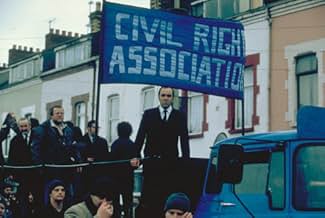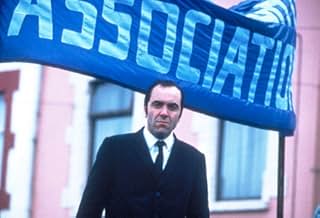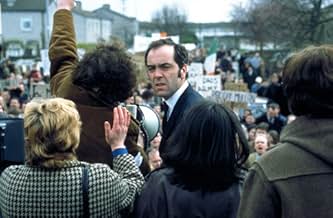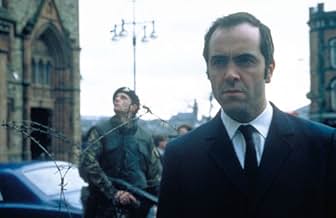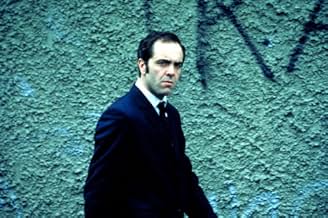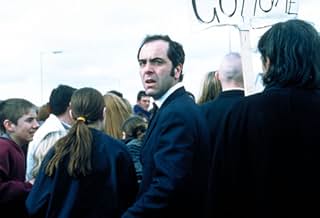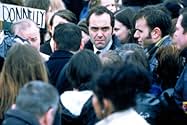IMDb रेटिंग
7.6/10
26 हज़ार
आपकी रेटिंग
अपनी भाषा में प्लॉट जोड़ेंA dramatization of the Irish civil rights protest march and subsequent massacre by British troops on January 30, 1972.A dramatization of the Irish civil rights protest march and subsequent massacre by British troops on January 30, 1972.A dramatization of the Irish civil rights protest march and subsequent massacre by British troops on January 30, 1972.
- 1 BAFTA अवार्ड जीते गए
- 19 जीत और कुल 23 नामांकन
Carmel McCallion
- Bridget Bond
- (as Carmel Mccallion)
Christopher Villiers
- Maj. Steele
- (as Chris Villiers)
फ़ीचर्ड समीक्षाएं
"Bloody Sunday" is a very startling, cinema-verite recreation of a very specific date (January 30, 1972), in a very specific place (Derry, Northern Ireland) of an event that for the Irish became "our Sharpeville."
But for an American audience with no benefit of subtitles for the brogues and working class Brit accents, no explanations outside of eventual context for lingo and slang (it took me awhile to keep track of "provos" vs "paras"), the quasi-documentary, in-your-face approach takes on a tragic universality.
It could be part of a Cassandra trilogy with `Black Hawk Down' and `No Man's Land' about why military should not be in charge in urban strife, whether as "peacekeepers" or in civil wars or regime changes, no matter how heinous the regime to be changed. A lesson for the Baghdad invasion planners?
Cities are complicated social ecologies, and the film shows a great diversity of attitudes and pressures on all sides, managing to be both clinical in meticulous detail and visceral in shocking impact. The film is probably not objective about the British (I don't think it's a coincidence that the imperious Brit "observer" who takes repugnant charge is played by Tim Pigott-Smith who was a similar colonialist in `The Jewel in the Crown.") A central universal image becomes the awesome power of rock-throwing, unemployed teen-age boys to spark war.
The liberals in the middle, clinging to dreams of Gandhi, Martin Luther King, and fair community relations, are morally destroyed over the course of a few hours and the extremists with guns on both sides feed on each other in perpetual destruction like the ouroboros image of the snake eating itself. I kept feeling I missed the exact flash point in a wandering attention moment and wanted to immediately re-watch it to see if I could track the gotcha! moment when escalation could have been prevented, so I look forward to this being available on video tape.
But the film does clearly show that it was attitudes that created the violent outcome and consequent government non-investigation, as we see in so many police situations. Once soldiers enter a city it is a police situation with all those complexities.
I know James Nesbitt primarily from frothy Irish comedies, like `BallykissAngel,' so his staggering portrayal of the M.P. in the middle is a revelation, as he goes from planning a civil rights march to pleading with his girlfriend to physical heroism to a break-down in shock.
The version of the titular U2 song played out at the end, running well past the credits finish, is a moving, live, passionate audience sing-along where Bono shouts out other locales that have experienced similar situations to emphasize the universality.
But for an American audience with no benefit of subtitles for the brogues and working class Brit accents, no explanations outside of eventual context for lingo and slang (it took me awhile to keep track of "provos" vs "paras"), the quasi-documentary, in-your-face approach takes on a tragic universality.
It could be part of a Cassandra trilogy with `Black Hawk Down' and `No Man's Land' about why military should not be in charge in urban strife, whether as "peacekeepers" or in civil wars or regime changes, no matter how heinous the regime to be changed. A lesson for the Baghdad invasion planners?
Cities are complicated social ecologies, and the film shows a great diversity of attitudes and pressures on all sides, managing to be both clinical in meticulous detail and visceral in shocking impact. The film is probably not objective about the British (I don't think it's a coincidence that the imperious Brit "observer" who takes repugnant charge is played by Tim Pigott-Smith who was a similar colonialist in `The Jewel in the Crown.") A central universal image becomes the awesome power of rock-throwing, unemployed teen-age boys to spark war.
The liberals in the middle, clinging to dreams of Gandhi, Martin Luther King, and fair community relations, are morally destroyed over the course of a few hours and the extremists with guns on both sides feed on each other in perpetual destruction like the ouroboros image of the snake eating itself. I kept feeling I missed the exact flash point in a wandering attention moment and wanted to immediately re-watch it to see if I could track the gotcha! moment when escalation could have been prevented, so I look forward to this being available on video tape.
But the film does clearly show that it was attitudes that created the violent outcome and consequent government non-investigation, as we see in so many police situations. Once soldiers enter a city it is a police situation with all those complexities.
I know James Nesbitt primarily from frothy Irish comedies, like `BallykissAngel,' so his staggering portrayal of the M.P. in the middle is a revelation, as he goes from planning a civil rights march to pleading with his girlfriend to physical heroism to a break-down in shock.
The version of the titular U2 song played out at the end, running well past the credits finish, is a moving, live, passionate audience sing-along where Bono shouts out other locales that have experienced similar situations to emphasize the universality.
10mariobc
I saw this film about 2 years ago, and was extremely impressed with the realism of the film.Having served with the British Army in Northern Ireland many years later I found the atmosphere and the general appearance and manner of the Paras extremely accurate, as I have seen many films about Ireland when trying to portray British soldiers they unfortunately could of done a little better. I consider myself to be open minded and understood and sympathized with the local catholic population during these events as this is or was pretty much how things are with regards to the catholic population in Northern Ireland.For me, the main good points were that the film was made in a documentary style in which the facts were shown in a straight to the point manner without any fancy computer effects or handsome faces portraying the main players. well done to the production team !!!!
Normally I don't enjoy the handheld documentary style films, as they tend to induce waves of nausea, but Bloody Sunday had me riveted from the word go. That we already know how it's going to end is irrelevant, the pressure building on the day of the march is almost unbearable. Though there's been criticism that the film is slanted towards the republican point of view, I found it balanced, even in the depiction of the soldiers and officers. Everybody certainly looked the part and I went away feeling some sympathy for both sides. Given the close quarters and inflammatory nature of the conflict, it's amazing that bloodbaths like this (soldiers blasting civilians) haven't happened more often in Northern Ireland. It's only now, that retired soldiers have broken ranks and talked about what actually happened, that a film like this can see the light of day.
I have seen "Bloody Sunday" twice now - once on the big screen and once on DVD - and read Don Mullen's book, "Eyewitness Bloody Sunday." This movie is a very realistic depiction of the defining moment of the "troubles" in Northern Ireland. The hand-held cameras and grainy film style make it feel more like a documentary than a movie, which of course is the intent. As another reviewer has mentioned, the acting is very natural throughout. It does take some time to get started, but once the the shooting starts it hits the viewer like a sledgehammer. Very powerful.
The film jumps so frequently from scene to scene that at times it is distracting, though I was much less annoyed by this the second time around. And, having seen it once with and once without subtitles, I must say that although the subtitles (optional on the DVD) are intrusive they are quite welcome. I love the Irish accent but at times it can be difficult for me to decipher,and much of the dialogue in the movie is muted. It was good to know what was being said.
As for the objectivity, of course the movie is slanted - so was the situation. But it is not unreasonably slanted. The British are not shown as one-dimensional demons - in particular, Nicholas Farrell does a great job of conveying Brigadier Mclellan's ambiguity and even disapproval of the course taken against his wishes by the supposed "Observer," Maj. Gen. Ford (who, if the movie has a villain, is the prime candidate.) At one point early on several Paras are discussing the day's prospects, and reveal how tired they are of being harassed, shot at and otherwise abused by the native population. This makes the day's events more understandable. This does not EXCUSE the cold-blooded gunning down of 27 people - there is no excuse for that - but at least one can see a contributing factor. And protesters are shown, once or twice, firing back. (The key here is firing BACK - evidence indicates that no marchers fired until the first two protesters were wounded. And those scattered few that attempted return fire were quickly dissuaded by their countrymen. Later in the day the IRA did go into action, but not until after the bloodletting in Bogside was over with.) Ivan Cooper's (James Nesbitt) words at the close of the film were shown to be all too true in the years since the actual incident. The IRA was on unsteady legs at the time, but has never lacked support since January 30, 1972.
The film is a powerful object lesson concerning the misuse of force, and one that governments everywhere - including my own country, the United States - should take to heart. It has a few flaws, but I think deserves the awards it has received. 8/10 points.
The film jumps so frequently from scene to scene that at times it is distracting, though I was much less annoyed by this the second time around. And, having seen it once with and once without subtitles, I must say that although the subtitles (optional on the DVD) are intrusive they are quite welcome. I love the Irish accent but at times it can be difficult for me to decipher,and much of the dialogue in the movie is muted. It was good to know what was being said.
As for the objectivity, of course the movie is slanted - so was the situation. But it is not unreasonably slanted. The British are not shown as one-dimensional demons - in particular, Nicholas Farrell does a great job of conveying Brigadier Mclellan's ambiguity and even disapproval of the course taken against his wishes by the supposed "Observer," Maj. Gen. Ford (who, if the movie has a villain, is the prime candidate.) At one point early on several Paras are discussing the day's prospects, and reveal how tired they are of being harassed, shot at and otherwise abused by the native population. This makes the day's events more understandable. This does not EXCUSE the cold-blooded gunning down of 27 people - there is no excuse for that - but at least one can see a contributing factor. And protesters are shown, once or twice, firing back. (The key here is firing BACK - evidence indicates that no marchers fired until the first two protesters were wounded. And those scattered few that attempted return fire were quickly dissuaded by their countrymen. Later in the day the IRA did go into action, but not until after the bloodletting in Bogside was over with.) Ivan Cooper's (James Nesbitt) words at the close of the film were shown to be all too true in the years since the actual incident. The IRA was on unsteady legs at the time, but has never lacked support since January 30, 1972.
The film is a powerful object lesson concerning the misuse of force, and one that governments everywhere - including my own country, the United States - should take to heart. It has a few flaws, but I think deserves the awards it has received. 8/10 points.
Although initially difficult to get into, Bloody Sunday proved worthwhile persevering, as the latter half puts the viewer in the carnage.
The acting, especially James Nesbit is excellent, the recreation of the mood is superb although it was obvious with the constant close ups that there was very little budget to recreate the scenery. The geography was never explained and therefore would leave a viewer without prior knowledge of the area disorientated.
The documentary suffered from not being able to set the scene, a lot had happened in the week prior to the Civil Rights march that put both the participants and the security forces on edge and made the advance more significant. The question of why the Paras were sent to Derry were never fully explored.
Overall it was flawless recreation of events from the point of view taken by the film makers on this particular incident. It is worth noting that this is based on the Irish Governments review of the Widgery report into Bloody Sunday. (NB the Widgery report is mostly considered by nationalists to be a white wash)
The acting, especially James Nesbit is excellent, the recreation of the mood is superb although it was obvious with the constant close ups that there was very little budget to recreate the scenery. The geography was never explained and therefore would leave a viewer without prior knowledge of the area disorientated.
The documentary suffered from not being able to set the scene, a lot had happened in the week prior to the Civil Rights march that put both the participants and the security forces on edge and made the advance more significant. The question of why the Paras were sent to Derry were never fully explored.
Overall it was flawless recreation of events from the point of view taken by the film makers on this particular incident. It is worth noting that this is based on the Irish Governments review of the Widgery report into Bloody Sunday. (NB the Widgery report is mostly considered by nationalists to be a white wash)
क्या आपको पता है
- ट्रिवियाTo make this movie as authentic as possible, no lights were used in the movie and the camera work was entirely hand-held
- गूफ़The marchers carry homemade cardboard signs with slogans written on them. When shown from behind, some have modern printing ("Made in China") on them that are not appropriate for 1972.
- भाव
Ivan Cooper: I just want to say this to the British Government... You know what you've just done, don't you? You've destroyed the civil rights movement, and you've given the IRA the biggest victory it will ever have. All over this city tonight, young men... boys will be joining the IRA, and you will reap a whirlwind.
- क्रेज़ी क्रेडिटThe live rendition of U2's Sunday, Bloody Sunday continues to play for a full three minutes over a black screen after the credits finish rolling.
- कनेक्शनFeatured in The 2003 IFP Independent Spirit Awards (2003)
टॉप पसंद
रेटिंग देने के लिए साइन-इन करें और वैयक्तिकृत सुझावों के लिए वॉचलिस्ट करें
विवरण
- रिलीज़ की तारीख़
- कंट्री ऑफ़ ओरिजिन
- भाषा
- इस रूप में भी जाना जाता है
- Domingo sangriento
- फ़िल्माने की जगहें
- उत्पादन कंपनियां
- IMDbPro पर और कंपनी क्रेडिट देखें
बॉक्स ऑफ़िस
- बजट
- £20,00,000(अनुमानित)
- US और कनाडा में सकल
- $7,73,228
- US और कनाडा में पहले सप्ताह में कुल कमाई
- $29,419
- 6 अक्टू॰ 2002
- दुनिया भर में सकल
- $17,58,689
- चलने की अवधि
- 1 घं 51 मि(111 min)
- रंग
- ध्वनि मिश्रण
- पक्ष अनुपात
- 1.85 : 1
इस पेज में योगदान दें
किसी बदलाव का सुझाव दें या अनुपलब्ध कॉन्टेंट जोड़ें

